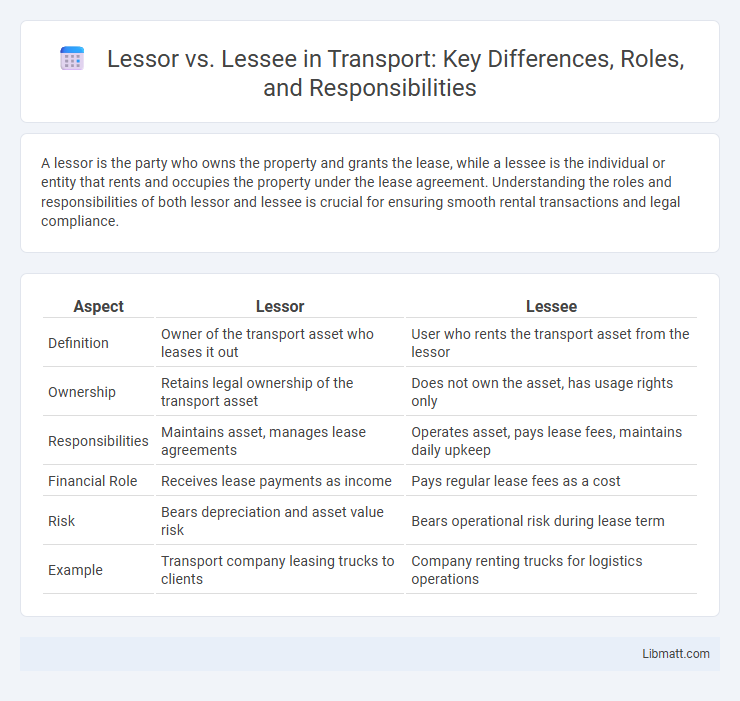A lessor is the party who owns the property and grants the lease, while a lessee is the individual or entity that rents and occupies the property under the lease agreement. Understanding the roles and responsibilities of both lessor and lessee is crucial for ensuring smooth rental transactions and legal compliance.
Table of Comparison
| Aspect | Lessor | Lessee |
|---|---|---|
| Definition | Owner of the transport asset who leases it out | User who rents the transport asset from the lessor |
| Ownership | Retains legal ownership of the transport asset | Does not own the asset, has usage rights only |
| Responsibilities | Maintains asset, manages lease agreements | Operates asset, pays lease fees, maintains daily upkeep |
| Financial Role | Receives lease payments as income | Pays regular lease fees as a cost |
| Risk | Bears depreciation and asset value risk | Bears operational risk during lease term |
| Example | Transport company leasing trucks to clients | Company renting trucks for logistics operations |
Understanding the Basics: Lessor vs Lessee
A lessor is the property owner who grants the right to use an asset, such as real estate or equipment, under a lease agreement. The lessee is the party who obtains temporary possession and use of the asset in exchange for periodic payments. Understanding the roles of lessor and lessee is essential for interpreting lease contracts and managing legal obligations effectively.
Key Responsibilities of a Lessor
The lessor is responsible for maintaining the property in a habitable and safe condition, ensuring compliance with all relevant laws and regulations. They must deliver the premises as agreed upon in the lease contract and handle necessary repairs unless otherwise specified. Furthermore, the lessor is tasked with respecting the lessee's right to quiet enjoyment and providing timely notice before entering the property.
Essential Duties of a Lessee
The essential duties of a lessee include timely payment of rent, proper maintenance of the leased property, and adherence to the terms specified in the lease agreement. Lessees are responsible for using the premises only for permitted purposes and must avoid causing damage beyond normal wear and tear. Compliance with local laws and notifying the lessor of any necessary repairs or issues is also a critical obligation for lessees.
Types of Lease Agreements
Lessor and lessee roles vary significantly across different types of lease agreements, including operating leases, finance leases, and sale-and-leaseback arrangements. In an operating lease, the lessor retains ownership and assumes most risks, while the lessee uses the asset temporarily without capitalizing it on their balance sheet. Finance leases transfer more risks and rewards to the lessee, who records the leased asset and liability, affecting your financial statements and asset management strategies.
Legal Rights of Lessors and Lessees
Lessors retain ownership rights and can enforce lease terms, including rent collection and property maintenance obligations, while lessees gain possessory rights to use the property within lease conditions. Both parties have specific legal protections: lessors can seek eviction for non-payment or breaches, and lessees have rights to quiet enjoyment and habitability. Lease agreements define these rights clearly, balancing control and responsibilities between lessor and lessee under landlord-tenant law.
Financial Implications for Lessors and Lessees
Lessors incur initial capital investment and ongoing maintenance costs but benefit from steady rental income and potential asset appreciation, impacting cash flow and tax obligations. Lessees avoid large upfront expenditures, preserving working capital, but face recurring lease payments and limited asset ownership benefits, affecting balance sheets and financial ratios. Both parties must carefully evaluate lease terms to optimize financial outcomes and compliance with accounting standards like IFRS 16 or ASC 842.
Common Challenges in Lessor-Lessee Relationships
Common challenges in lessor-lessee relationships include disputes over lease terms, maintenance responsibilities, and rent payment delays. Miscommunication regarding property condition and repair obligations often leads to conflicts requiring legal intervention. Ensuring clear lease agreements and regular communication helps mitigate risks and fosters a cooperative landlord-tenant dynamic.
Termination and Renewal of Lease Contracts
Lessor and lessee both hold specific rights and obligations regarding the termination and renewal of lease contracts, with lease terms typically outlined in the agreement to specify conditions for ending or extending the lease. The lessor generally retains the right to terminate the lease upon breach of contract or non-payment by the lessee, while the lessee may request renewal subject to the lessor's approval and agreement on new terms. Renewal clauses often include notice periods and conditions for rent adjustments, ensuring clarity and legal protection for both parties throughout the lease lifecycle.
Important Clauses in Lease Agreements
Important clauses in lease agreements define the rights and obligations of both lessor and lessee, such as rent amount, payment schedule, and security deposit terms. Maintenance responsibilities, duration of the lease, and conditions for renewal or termination are critical to preventing disputes. Clear articulation of these clauses protects your interests and ensures a smooth leasing relationship.
Frequently Asked Questions on Lessor vs Lessee
A lessor is the property owner who grants the lease, while the lessee is the individual or entity that receives the leasehold interest and agrees to pay rent. FAQs often address differences in responsibilities, such as maintenance obligations and legal rights during the lease term. Common questions include who is liable for property damages, how lease termination is handled, and the specific rights each party holds under lease agreements.
lessor vs lessee Infographic

 libmatt.com
libmatt.com